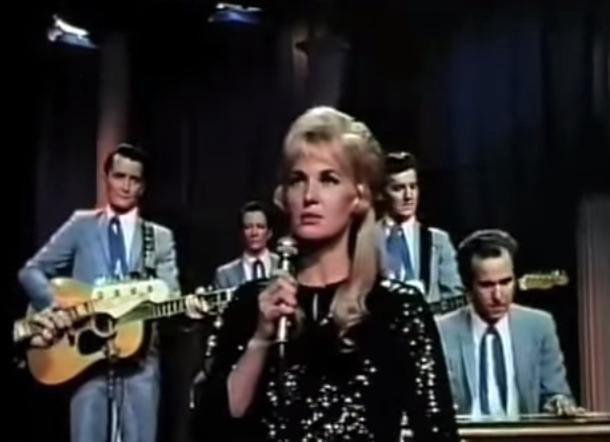Standing by Your Man
by Casey N. Cep

The year was 1968. In May, Wynette sang courageously about the heartbreak of “D-I-V-O-R-C-E.” Then, in September, she offered the heart-aching advice to “Stand By Your Man.” Both songs topped the charts, but she’s remembered mostly for the staying, and not for the going — which is odd, since Wynette divorced five different husbands.
It’s odder still since “Stand By Your Man” is not so much revered as reviled. Women are accused of standing by their men, not applauded for it. Political wives are almost always judged by this standard, at least since 1992, when Hillary Clinton invoked the song during an interview with 60 Minutes. She and her husband, then the governor of Arkansas, were being interviewed by Steve Kroft; after a few minutes of Jesuitical questions about paramours and press statements, he said, “Most Americans would agree that it’s very admirable that you have stayed together — that you worked your problems out and that you seem to have reached some sort of an understanding — an arrangement.”
President Clinton interrupted to say, “Wait a minute, wait a minute, wait a minute. You’re looking at two people who love each other. This is not an arrangement or an understanding. It’s a marriage, and that’s a very different thing.”
Secretary Clinton interrupted her husband to clarify: “You know I’m not sitting here as some little woman standing by my man like Tammy Wynette. I’m sitting here because I love him, and I respect him, and I honor what he’s been through and what we’ve been through together. And you know, if that’s not enough for people, then heck: don’t vote for him.”
Hillary is Loretta Lynn, not Tammy Wynette: more “Fist City” (“I’m not a sayin’ my baby’s a saint ’cause he ain’t and that he won’t cat around with a kitty”) than “Stand By Your Man.” Because of what Hillary said that night, practically every wife, during every political scandal, has been asked if she’ll stand by her man, and then, finally, described as having stood by said man. The song is invoked, not as a praiseworthy paean to marital fidelity, but as a political punchline: Will she stay or will she go?
It’s an unfortunate fate for a beautiful song. Wynette always said she wrote it in fifteen minutes, but lyrically it’s a song that took a lifetime to write. “Sometimes it’s hard to be a woman,” Wynette croons at the start, which it is, no matter the men or women you’ve been with before, or that you’re with now. The song deeply sympathizes both with how hard it is to be a woman and how difficult it is to be with someone. “You’ll have bad times,” she sings, “and he’ll have good times, doin’ things that you don’t understand.”
That, of course, is the truth: Partners will fail you. They’ll eat peanut butter from the jar; they’ll spend more money than you have; they’ll want children before you do; they’ll dislike your family or your friends. Relationships of any kind are difficult. They are also almost entirely impenetrable to those outside them. It’s a beautiful mystery why some relationships last, and a confusing tragedy why others do not. Who stays and who goes is rarely understood by those on the outside, since it is not always understood by those on the inside.
That is why Wynette’s song is so beautiful. Not because you should always stay, but you should try to stay. Wynette says “keep giving all the love you can,” which intimates that there are limits to love — that you might give all that you can, but even that will not be enough. And if it isn’t, then you “D-I-V-O-R-C-E.” That song, though her manager expected it to be the one that defined her career, is mostly forgotten. It’s melodramatic, but so is every divorce.
“Our little boy is four years old,” Wynette begins, “So we spell out the words we don’t want him to understand.” Spelling songs were nothing new (Aretha Franklin had released “Respect” in 1967), but this one spelled joyful words like toy, surprise, and the boy’s name in juxtaposition with sorrowful words like divorce, custody, and hell. “The words we’re hiding from him now,” Wynette says, “tear the heart right out of me.”
Twice she sings, “I wish that we could stop this D-I-V-O-R-C-E,” but of course she won’t. It’s like wishing you could stand by your man after you realize you can’t: Wishing doesn’t make it so. And that is, of course, what’s so painful about almost every separation, every divorce of any kind: Even when you feel empowered to go, you have no power to stay. After all, he’s just a man or you’re just a man or she’s just a woman: We’re all just people. A cliche like any other, but like all the others, true.
Tammy Wynette was called the First Lady of Country Music — fitting not only because she was married once to George Jones, but because she occupied a political role in its canon. She didn’t stay, but she sang about trying to, and she didn’t want a divorce, but she sang about getting one.
Casey N. Cep is a writer from the Eastern Shore of Maryland.
